The Theranos example
The notorious case of Theranos provides a relatively recent example of whistleblowers breaching their NDAs to report a case of serious wrongdoing. Founded in 2003 by then 19-year-old Elizabeth Holmes, the blood testing startup raised $700 million and was valued at $10 billion at its peak. While it looked like Theranos was aggressively protecting its trade secrets through NDAs, it was actually covering up major shortcomings in its supposedly groundbreaking blood testing technology.
All visitors to the Theranos office had to sign NDAs. This was likewise normal for employees who were also pressured into signing severance agreements with far-reaching restrictions on what they could divulge about the company’s activities after their departure. Several former employees blew the whistle regardless and it all came tumbling down. Holmes and former company president Sunny Balwani were charged with fraud by the US Securities and Exchange Commission in 2018 and both have started lengthy prison sentences.
NDA as a gagging mechanism
As demonstrated by the Theranos whistleblowers, an NDA will not impede people with a strong moral compass. In some cases, organisations offer whistleblowers an NDA and a large financial settlement in exchange for any allegations of wrongdoing to be dropped. Alison McDermott spoke out about problems in the workforce at Sellafield, the UK’s largest nuclear site.
After having her contract terminated, Alison was offered a large settlement in exchange for dropping her case and signing an NDA. She turned down the offer despite having no income and bearing substantial legal costs.
When we asked her about this decision, she was steadfast in her response: “I wanted to air my concerns in court. I wanted the wrongdoing brought to light and I was not prepared to sign an NDA and effectively be gagged. I do not regret this decision because I could not have lived with myself otherwise. My silence is not for sale”. Alison later told her story at the European Compliance and Ethics Conference 2023 and you can view the video below.
Earlier this year, Fortune reported that some of America’s biggest technology companies including Apple and Electronic Arts are improperly using NDAs that prohibit employees from reporting bad behaviour to the regulator. The Securities & Exchange Commission said that the firms in question are using these agreements to illegally muzzle whistleblowers by threatening to sue them for talking.
NDA enforceability and employee psychology
Bravery and courage are one part of speaking out. Legal certainty is quite another. Most companies insist on NDAs being signed by employees even though they are aware that most courts are unlikely to enforce them, particularly if they are breached by a whistleblower with good intentions.
Depending on the organisation, an NDA can be complicated and contain a considerable number of clauses, some of which can be enforced. In events of obvious wrongdoing such as when a worker points out a serious health and safety violation to the relevant authority, it would constitute a good faith breach of an NDA, which would not result in repercussions.
Alternatively, neglecting internal processes, bypassing the relevant authorities and blowing the whistle via the media in an attempt to slander the employer would be a bad faith breach of the NDA that could result in legal action.
NDAs tend to act as a psychological tool to dissuade employees from speaking out and they are effective at achieving that goal. While whistleblowers can mostly avoid legal repercussions, they should still consider approaching someone with the proper expertise before making their complaint.
How to blow the whistle after signing an NDA
While NDAs are not typically binding when it comes to reporting criminal activity or information in the public interest, employees are nevertheless advised to consult a legal professional before speaking out. This could take the form of a lawyer or legal firm specialised in whistleblowing who can thoroughly analyse and evaluate the NDA, as well as any aspects of the agreement that could prove problematic in court.
Some companies utilise an ombudsman to assess disputes independently and advise both sides in accordance with the organisation’s compliance guidelines. Given that the ombudsman adheres to confidentiality and has to comply with data protection regulations, this point of contact can also provide important advice on how to proceed with a complaint in the face of an NDA. The same principle applies to a digital whistleblowing system in cases where an impartial arbitrator is utilised as the resolution mechanism.
A digital solution can also be effective when complaints are both submitted and resolved internally. This can empower employees to air their grievances within the company which helps the organisation investigate and resolve issues internally at an early stage. Keeping things internal also avoids a public violation of an NDA along with any ensuing legal consequences.
Conclusion
Unfortunately, internal solutions can only function when organisations implement an effective compliance and speak-up culture whereby proper confidential reporting channels are made available to employees. As Theranos has shown, some companies are still intent on using NDAs to muzzle or gag their employees so that they can cover up bad behaviour. In such situations, it is important to remember that an NDA is not a barrier to blowing the whistle and most of its provisions are likely not enforceable. However, potential whistleblowers should still exercise caution and only speak out after thoroughly examining the situation with a legal expert.
Whistleblowing Laws in the European Union
A glance at the implementation of the EU Whistleblowing Directive in EU Member States









